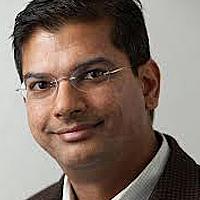Is Healthcare Going to See an Uber? These 3 Things Should Give You Pause
April 30, 2015
|
Deepak Prakash |
Some experts think healthcare is ripe for an Uber- or Airbnb-type disruption. But Deepak Prakash at Vancive Medical Technologies is more of a realist.
Chris Newmarker
Talk to someone in fields such as medical sensors and wearables, and odds are you'll hear a lot of words such as "revolutionary," "disruptive," and "game changing." (Qmed/MPMN has repeated plenty of those words itself.)
In reality, people may have to wait 20 to 30 years for healthcare to truly change, says Deepak Prakash, global director of digital health at contract manufacturer Vancive Medical Technologies.
"It's a different beast. Things don't change very rapidly in healthcare," says Prakash, who is based out of Chicago for Vancive, which is part of Avery Dennison Corp. (Glendale, CA). (See Prakash discuss, "Leveraging Emerging Healthcare Sensor and Remote Technologies," at MD&M East, June 9-11 in New York City.)
In charge of marketing and commercial activities for Vancive's Digital Health business, Prakash has a great deal of hope that health sensors and wearables will eventually improve healthcare. "It's probably one of the most promising technologies," Prakash says.
But he is more skeptical when it comes to the prospects of changing such a complicated and entrenched industry.
Contrast Prakash's views Stuart Karten, the founder and principal of Karten Design (Los Angeles). Karten thinks Uber-like medical companies will emerge in the next decade:
"We are also seeing a transformation of the man-machine relationship--we are starting to wear computers, and soon, we will be implanting them into our bodies to connect with our communication systems, cars, and homes. As artificial intelligence improves, it will help us interact with increasingly smart environments. In healthcare, highly evolved sensors and powerful algorithms will give us proactive, personalized care. By 2035, the majority of our treatments will occur at home. Our home will be watching us and helping us track our health."
Prakash gives it a little more time, especially because healthcare is not a transaction between two people such as buying a car ride (Uber) or staying in someone's home (Airbnb). There are doctors, other health providers, health insurers, employers, government agencies, and more factors to consider.
Here are three things Prakash thinks will have to be overcome to disrupt healthcare:
1. Getting Beyond the Concept Stage to Mainstream
Prakash suspects that health wearables are about where electronic cars were 20 years ago: really neat gizmos but not yet proven technology.
To go mainstream, wearables will have to accurately provide the data that doctors and other health providers actually need, Prakash says.
Take smartphone-based ECGs such as AliveCor as an example. They are able to provide plenty of useful data. But for more complex heart conditions, a Holter monitor is still needed, according to Prakash.
When it comes to many type of wearables, not everything about a person's condition is being taken care of, Prakash says. "Technology hasn't gotten there yet."
2. Operational Hurdles
A tremendous amount of investment is still needed to create the data systems, cloud-based platforms, and analytics to effectively handle the health data wearables could potentially produce.
Health providers need to change their entire operational frameworks, and public and private health insurers have yet to set up the systems to pay for it.
"All of this has to be taken care of for it to be mainstream," Prakash says.
3. Embracing Consumer Engagement
Used to doing online research about just about everything, people are ready to engage more with their doctors and other health providers.
But many doctors simply aren't ready. They're still stuck in the old model, in which patients followed doctors' orders. In addition, many doctors remain skeptical whether all this new wearables data is really useful, Prakash says.
Prakash suspects a generational shift will have to take place before doctors and other health providers truly embrace "consumer engagement."
"In about 10 to 15 years, you'll see that some digital technology has replaced the old way of doing things."
See Prakash discuss, "Leveraging Emerging Healthcare Sensor and Remote Technologies," at MD&M East, June 9-11 in New York City. |
Chris Newmarker is senior editor of Qmed and MPMN. Follow him on Twitter at @newmarker.
Like what you're reading? Subscribe to our daily e-newsletter.
About the Author(s)
You May Also Like



